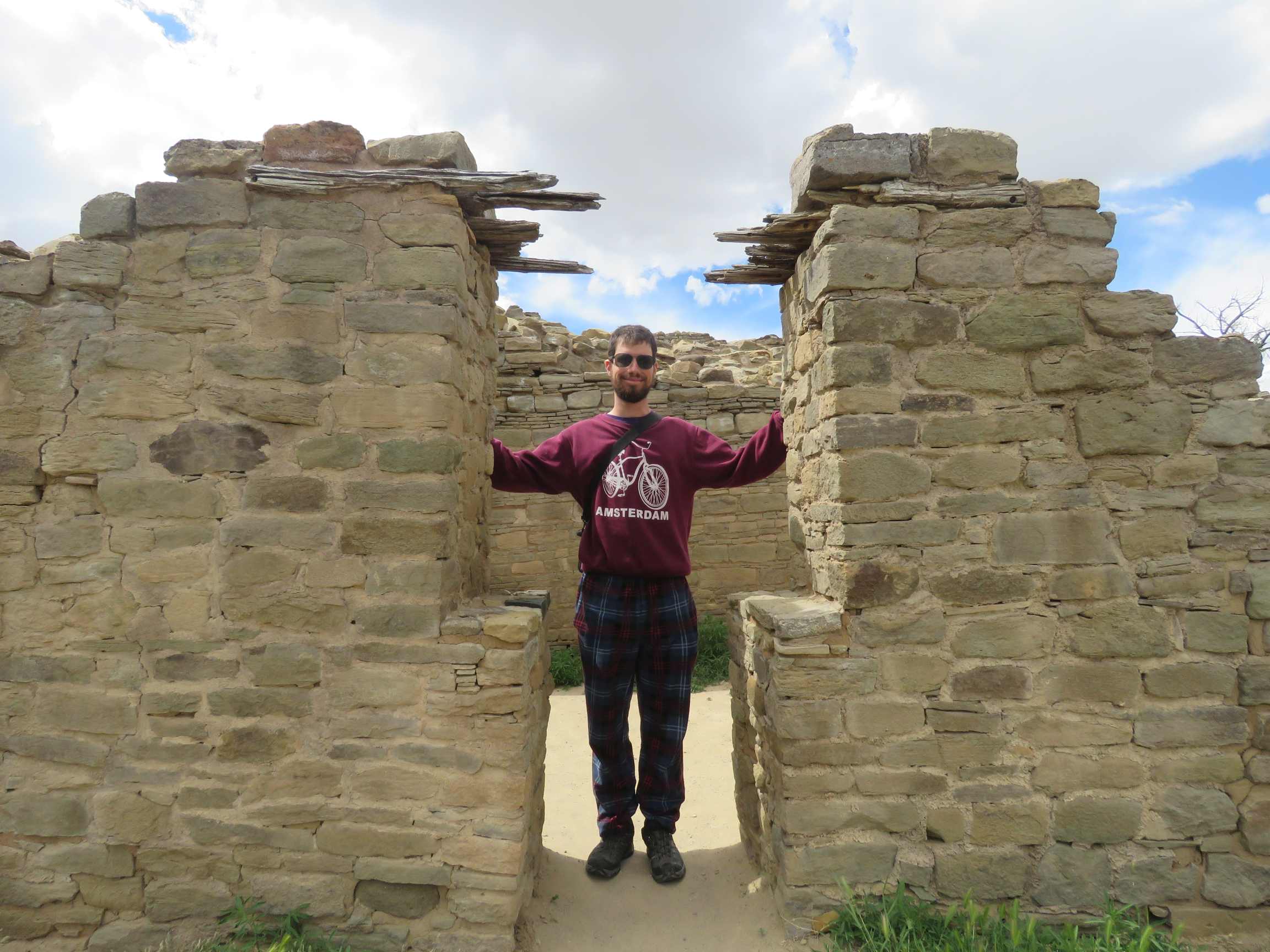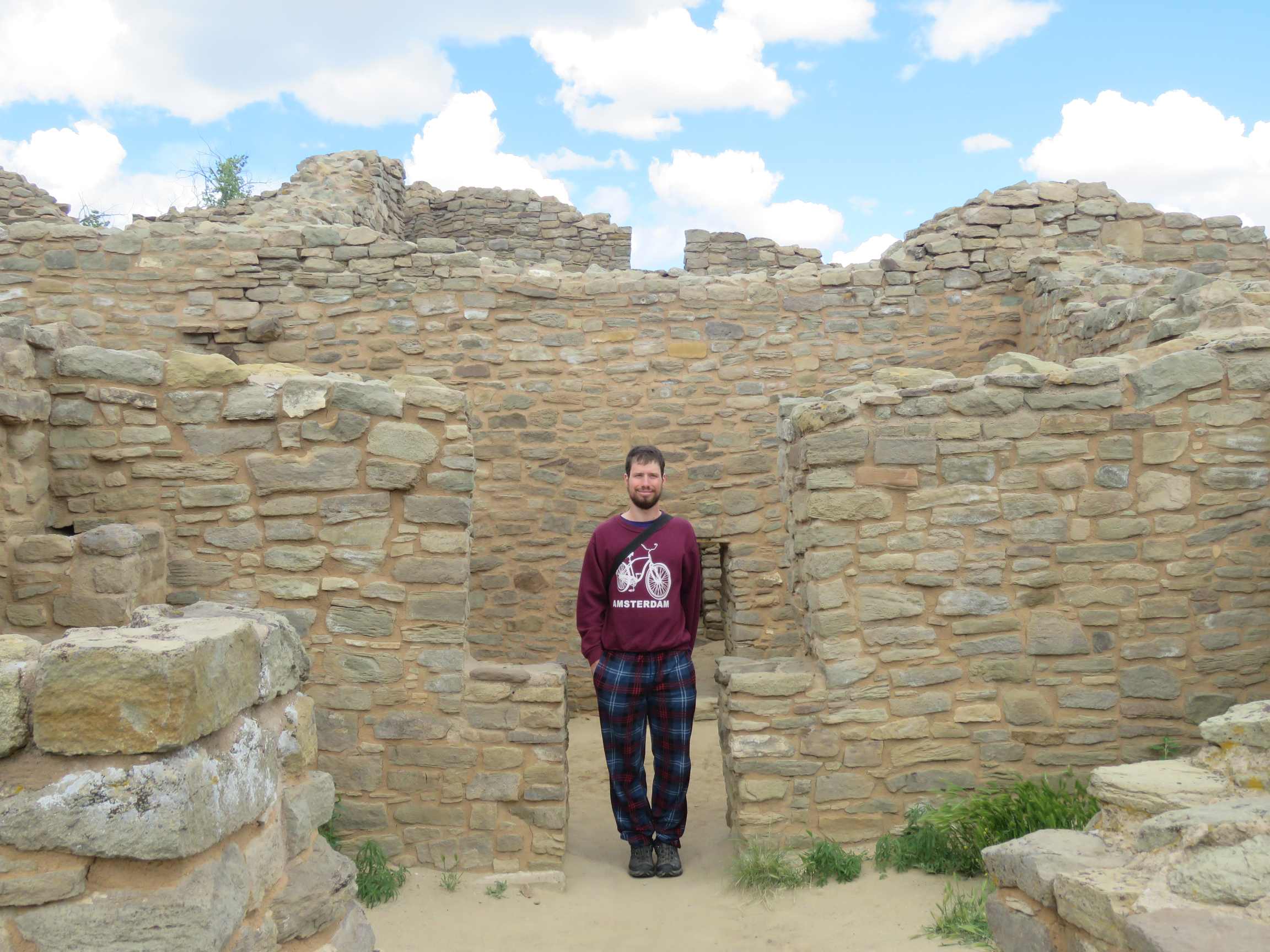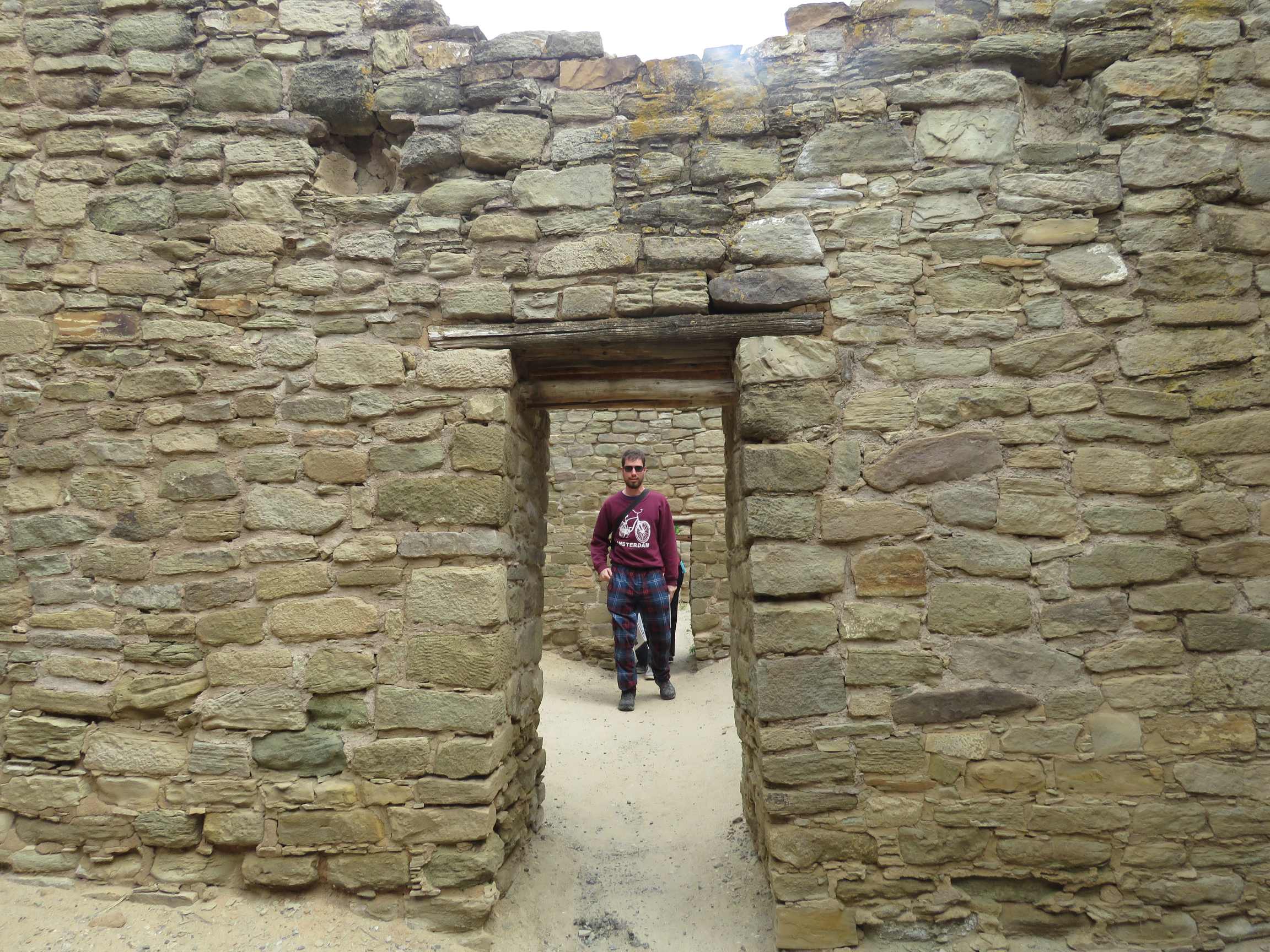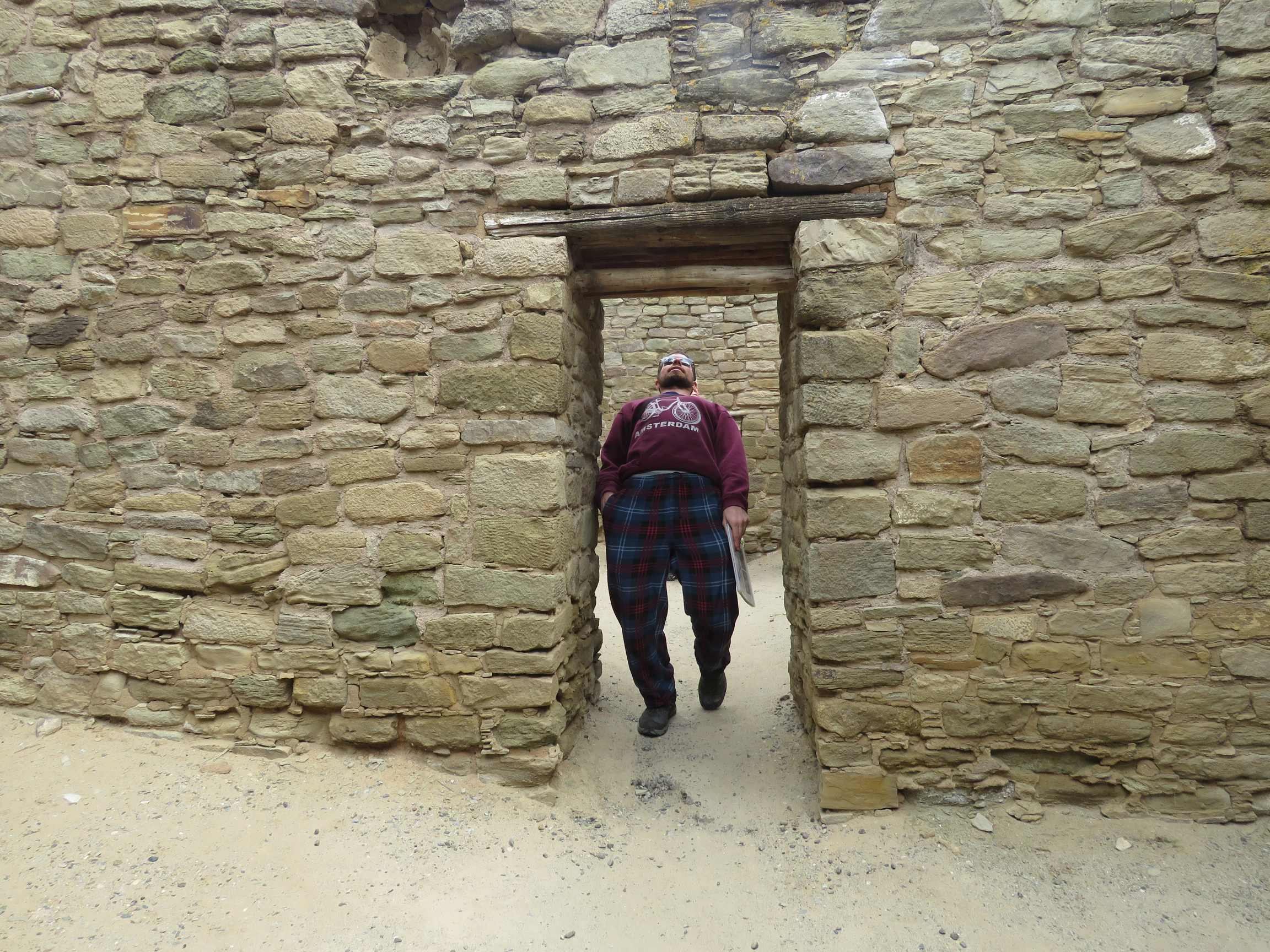Return to Index
Day 35 - May 29 - Quilts, Ruins, and Battles That are not Mine
"Wow! Cars really do go fast!"
Hi, and welcome back to my bike blog.

Battles That are not Mine to Fight
I am a Rich White Male
Sarah once told me of a friend who, in a class, said something along the
lines of "I am a rich white male, so I don't matter."
When she quoted this to me, I realized that in the past few years, I've really spent a
lot of time thinking about the ideas bundled up in that statement, and its variants. I've
said things similar to it before, and I've heard people say similar things to it before. Some
say that it should be turned into an abbreviation, RMW-IDM, to be prefaced before anything
an RMW might say or write.
The basic tenet of the statement, is that, as a member of the oppresive class, one should
be careful in opining on sensitive subjects about societal subjugation. I've heard it
being used in ways similar to the useage of "I'm not racist, but..." and "... but that's just
my opinion." It's a kind of apology, but it also seeks validation. The only response to
RMW-IDM is "no, no, we'd like to hear what you have to say," which, to the speaker, is
an affirmation that they are on the "good side" of whatever discussion is being had. The
statement comes from a desire to fit into politically correct culture, and to be seen as
a progressive member of an oppressive class.
So what's the problem with RWM-IDM? It's misleading. There's something
lost in translation in the flippant sarcasm of it, that ends up sounding like a
declaration of hopelessness. It's said, and then quoted by others to justify the
conspiracy theory that white males are oppressed, confused, and misguided by politically
correct culture. Eventually, even the person saying this might believe it, and start
thinking of themselves as less able to effect change, since nothing they might do matters.
None of this is the point of RWM-IDM. The point of RMW-IDM is simple validation.
So what's the problem with simple validation? Is there more harm in such a statement?
I think so, since I see it as an excuse for inaction.
Inaction is Privilege
I used to be apolotical in action. In thought and discussion, I've always touted
politics, but always refused to back some political party or politician over the other.
In Israel, I didn't vote, I didn't participate in protests, and always said things
like "both sides suck." I thought it elevated me above the muddy brawls of partisanship.
One day, and I wish I remembered who it was, a friend told me that being
apolitical was exercising privilege. Overnight, my views changed. I'd like to say that
I immediately understood what was being said, but in reality, I'm still thinking about it.
The idea I understood was that being apolitical is equivalent to backing the status
quo. It's a declaration that I'm just along for the ride, and that what will happen will
happen. I am not a hero, and I will not work whatever ability I have to change the world.
Being able to hold this opinion implies that I am not worried about who leads the
country, and what laws are changed. It means that no matter who is in power, I, personally,
will be ok. It means that no matter what happens on the political sphere, I have the
correct wealth, race, gender, education, and social network to weather it. This
is privilege.
Okay, so what? I have a world opinion consistent with my privilege. Privilege is not
something to avoid, and it is not inherently bad. But it is something that colours
all actions, or inactions, and, like lifestyle creep, it is something that is
important to be at least aware of. When I heard "apolitical-ness is privilege,"
I noticed that my political inaction was not just about my own life. Inaction itself
is harmful to others, and it's a harm I am immune from solely due to my background.
If I want to be the best I can be, I need to not cause harm to others. I must learn
to act, and to flip the switch on privilege. I need to use it to effect
changes, as opposed to using it to live through them. I need to be political,
to start fighting for what I believe in.
Battles I Cannot Fight
So let's say I've learned about the
missing and murdered indigenous women in Canada. I've learned all the stats, the talking points,
and the problems related to the issue. Now I want to take action. I'm not being discriminated against, and
this is not my theatre. I can't start a petition or call my MP about this, as this issue is not related to me.
I should not be taking attention away from those who actually are affected by it.
Another example might be my issue with discriminatory hiring practices at my job. Let's
say that I've learned that 80% of my co-workers are white males. In this case, it's not that
I cannot fight this, but that I can't see what I could do about it. I don't have the power,
and so I cannot fight. As I write this, I am reminded of the First They Came...
poem by Martin Niemoller.
What I can do
A while ago, a friend was asking the same question. "I really wish that my workplace hired more
minorities, and they really try, but we don't get many applications. What can we do?" In a
round-table discussion at a conference about issues women face in mathematics, a prominent
professor asked, after hearing stories upon stories about bad behaviour and discrimination,
"so what can we, as allies, do?"
I feel dumb writing this at my age. I feel strange that I was never taught this in
school. I was never told, step by step, how to be helpful. I've always been taught about
direct action taken by historical figures, and about the civil process of lawsuits,
democracy, and activism. But never, in my entire education, have I ever been told
how to be an ally.
I'd like to write down some of the things I've learned. Some of my readers will disagree, and I
would love to hear more. As always, if anyone would like to write a guest post, just send me the
plain text and I'll paste it as is.
I've learned that the important things that I can do are to listen, believe, research, spread
the word, and donate. In that order.
Listening means just that - it means to listen to what
the people who are able to lead these fights have to say. I've been a bad listener
for a long time, and I'm still working on it. I've learned that without listening, there's no
way to learn.
Believing is not a blind unquestioning following, but rather is a challenge to change my opinions. If
someone tells me a story that happened to them, or tells me about a particular action I can take, I
need to trust them, and really understand that they are telling the truth about the world. I need
to understand that others often know helpful actions better than I do. I need to not be afraid of being
lied to, because it's better to be gullible and trusting than cold and uncaring.
Research is research. It means reading literature, blog posts, histories, and news stories. Research
means spending time and work to understand the bigger picture. Research
also means finding out what organizations work towards progress on the issue. Research is
hard, and I'm very bad at it.
Spreading the word is the dual of research. To me, it means teaching others about issues, and
sharing research resources. It means making sure that my friends know about the issues I think are
important for them to know about, with the expectation or hope that they might care about them too.
In some sense, spreading the word is the best way that allies are created.
Finally, the easiest way to help is to donate. Time, money, and expertise can be donated, and hopefully
after some research, it's easy to see what is best to donate, and to where.
I try to do these things. I've got a long way to go, and I'm hoping to learn more in the future. I'd like
to be someone who will make past Assaf proud, and will not make future Assaf ashamed. The former
is a much easier goal than the latter, but this is all a part of my journey of self-improvement
and personal development. The first step for me in any such project is asking the
all-important question: "what can I do today?" Today, the answer was to write this blog.
The Image Gallery

I bought some warm clothes at Goodwill, where the signs are in
English and Navajo

Teesie drove me to the Aztec ruins. They are just named that, they
aren't actually Aztecs, but rather an old Puebloan settlement from
around 1100AD. (Thanks Greg)


This round building is called a kiva. Not much is known about its
purpose, but it was used for group gatherings of some kind.

Inside one of the rooms in the Aztec ruins.

Looking into an excavated room

These holes held the floorboards of the second floor. Some of these
buildings were three stories tall.

Windows

Doors

A view of most of the site from a hill. A lot of the hills nearby
are unexcavated buildings.



Pictures of me.
My knees were hurting from biking, and I didn't want to bend them
to get through these low doorways. So I found another solution:

Teesie's Bike Quilts
Teesie makes amazing quilts, and some of them are even up for sale
if you are interested. Here's all the ones I found with
bikes in them:









If you'd like her contact information, shoot me an e-mail.
Thanks for reading! See you tomorrow!
Return to Index























